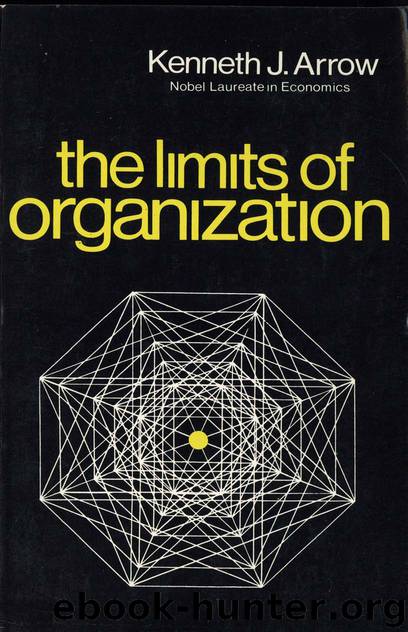The Limits of Organization by Kenneth J. Arrow

Author:Kenneth J. Arrow
Language: eng
Format: epub
Publisher: W. W. Norton & Company
4
AUTHORITY AND RESPONSIBILITY
1. A conflict fo goals
AMONG THE MOST widespread characteristics of organizations is the prevalence of authoritative allocation. Virtually universally, in organizations of any size, decisions are made by some individuals and carried out by others. The fields in which an authority is valid may be limited; and the recipient of orders at one level may have his own field for authority. But within these limits, the giving and taking of orders, having someone tell someone else what to do, is an essential part of the mechanism by which organizations function.
The giving and taking of orders might be termed personal authority; there is also another mode of allocation which might be called impersonal authority, through codes of conduct which prescribe what each member of the organization is to do under a variety of possible circumstances. The legal code is an outstanding example of impersonal authority. Since personal authority cannot be everywhere, the establishment of impersonal authoritative codes is a necessity. But it may supplant as well as supplement personal authority, having the advantage of greater predictability, along with the disadvantage of lesser flexibility.
In what follows, I shall refer primarily to personal authority; but many of the remarks will also be applicable to the impersonal variety.
The role of authority does vary among organizations. The military is the extreme case, in which authority is allpervasive and essential. The state also exemplifies authoritative behavior in relation to its citizens, particularly with respect to police and legal control. The state shares with firms a more limited kind of authoritative control over employees. Indeed, as Herbert Simon has emphasized, an employment contract is precisely a contract on the part of the employee to accept authority. It differs therefore from a contract to purchase a commodity; what is bought and sold is not a definite objective thing but rather a personal relation. Within the scope of the contract, the relation between employer and employee is no longer a market relation but an authority relation. Of course, the scope of this authority will usually be limited by the terms of the contract, and, more fundamentally, it is limited by the freedom with which an employee can leave the job. But since there is normally some cost to the exercise of this freedom, the scope of this authority is not trivial.
Among the large organizations of our society, authority is perhaps weakest among the professions. Here, codes of ethics and standards of conduct imposed by social pressures tend to displace the more overt forms of personal or even of impersonal authority. Professional organizations have only limited and exceptional power over their members, and then only in cooperation with the state, as in disbarment; they may and frequently do, however, help in controlling entry. It is not surprising, perhaps, that universities, which have grown to have a curious mixture of educational functions, where authority is traditional though questioned, and professional concerns, should have special difficulty in defining the internal role of authority.
When conditions are stable, the role of authority,
Download
This site does not store any files on its server. We only index and link to content provided by other sites. Please contact the content providers to delete copyright contents if any and email us, we'll remove relevant links or contents immediately.
International Integration of the Brazilian Economy by Elias C. Grivoyannis(111064)
The Radium Girls by Kate Moore(12033)
Turbulence by E. J. Noyes(8055)
Nudge - Improving Decisions about Health, Wealth, and Happiness by Thaler Sunstein(7711)
The Black Swan by Nassim Nicholas Taleb(7136)
Rich Dad Poor Dad by Robert T. Kiyosaki(6642)
Pioneering Portfolio Management by David F. Swensen(6303)
Man-made Catastrophes and Risk Information Concealment by Dmitry Chernov & Didier Sornette(6022)
Zero to One by Peter Thiel(5805)
Secrecy World by Jake Bernstein(4755)
Millionaire: The Philanderer, Gambler, and Duelist Who Invented Modern Finance by Janet Gleeson(4481)
The Age of Surveillance Capitalism by Shoshana Zuboff(4301)
Skin in the Game by Nassim Nicholas Taleb(4253)
The Money Culture by Michael Lewis(4211)
Bullshit Jobs by David Graeber(4195)
Skin in the Game: Hidden Asymmetries in Daily Life by Nassim Nicholas Taleb(4009)
The Dhandho Investor by Mohnish Pabrai(3770)
The Wisdom of Finance by Mihir Desai(3751)
Blockchain Basics by Daniel Drescher(3585)
